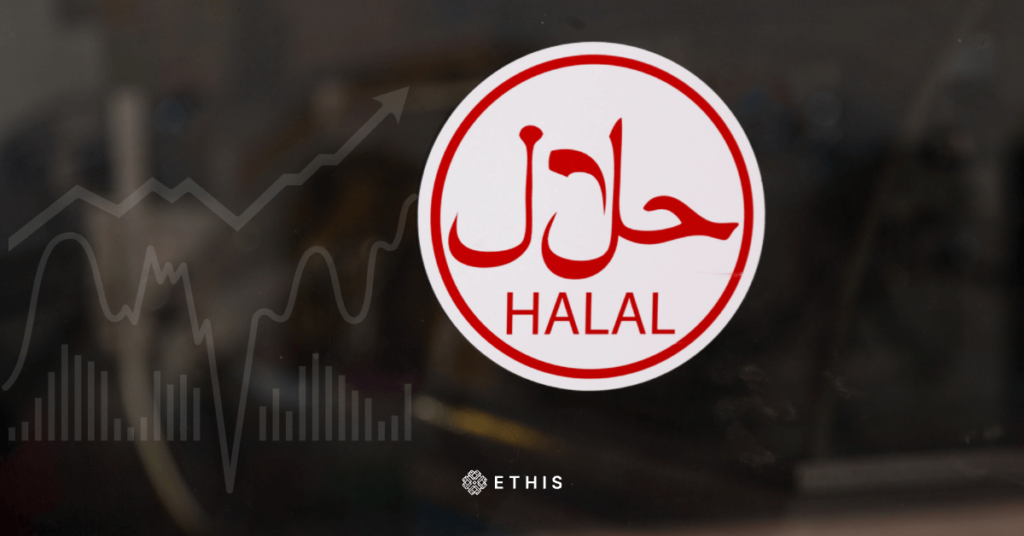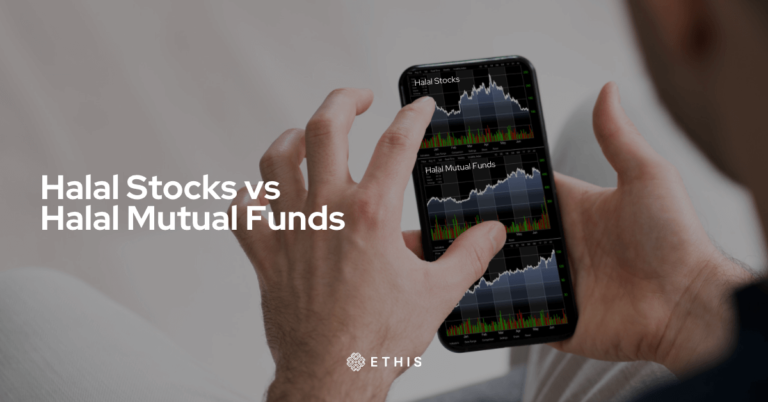
In the realm of halal investing, several prominent vehicles and strategies exist to help safeguard the ethical and financial interests of Muslim stakeholders. Among these options are halal stocks and halal mutual funds.
What are the differences between the two choices and which one is more suitable for your preferences and requirements? Let’s take a look at the basics between halal stocks and halal mutual funds as well as their direct pros and cons in relation to halal investing.
Related: How to Identify non-Shariah Compliant Investments
What are halal stocks?


Stocks indicate ownership shares of a publicly traded firm, including a claim to a share of the corporation’s assets and earnings.
When you buy a stock, you own a tiny part of that corporation. If the company’s value increases or drops, the value of your stock investment increases or decreases with it.
Any money you gain from a stock originates from the operations of the firm, therefore Muslim investors usually want to know how the company functions and how it produces its money. Stocks are part of the “equity” market, hence they may also be referred to as “equities.”
In other terms, a stock (also known as shares and equity) is a sort of security that denotes ownership in a corporation and reflects a claim on some of the corporation’s assets and revenues.


Stocks can only be considered halal if the firm passes both qualitative and quantitative assessments to gauge if it is actually shariah compliant.
The elements that are checked for halal stocks include the businesses the corporation is engaged in, percentage of interest related income, and trading procedures.
Investors who are planning to invest in halal stocks are expected to undertake particular screening methods to verify that their investments will be 100 percent halal.
How to identify halal stocks


There are several ways to check if a stock is Halal or not, and whether it .follows Islamic principles.
Run a fact check about their procedures and discover if the things they create and sell are ethical and halal.
Since Muslim investors are not allowed to invest in stocks of companies involved in haram items, looking through their business plan first would help you rule out non-compliance.
You could also do extensive research into the company’s operations.
Many Muslim investors may be concerned that some businesses are secretly engaged in haram practices.
While their business plan may portray them as ethical, the reality may be quite different.
Many businesses operate according to haram principles, such as riba.
Check their annual reports to see if they received revenue from non-shariah compliant investments to learn more about how the company is run.


What are halal mutual funds?


Halal mutual funds operate similarly to traditional funds, with the exception that they only invest in shariah-compliant investments which adhere to Islamic beliefs, such as being free of Riba (interest) and Gharar (financial penalties).
Investments in halal mutual funds are made in shares of joint stock companies, and profits are earned through capital gains in the share value, as well as dividends paid by the companies. Trading in Shariah-compliant mutual fund shares is permissible under shariah if the following two conditions are met:
The company’s nature of business must be Shariah compliant (for example, construction or export of Halal meat), and the company must not engage in prohibited elements or activities.



Key attributes of halal mutual funds


A Muslim is not allowed to invest in any type of fund, according to Islamic law. There are certain restrictions on their investment, such as a shariah compliant mutual fund that invests within Islamic law’s boundaries.
These funds’ distinguishing characteristics are as follows:
Muslims are prohibited from investing in any asset that can harm others (physically or emotionally), the environment, or organisations that support illegal or harmful activities, among other things.
These funds forbid investments in companies that make a significant portion of their revenue from the sale of alcoholic beverages, drugs, tobacco, pork, weapons and other military equipment, gambling, and erotica. All of these activities are considered haram.
According to the Holy Quran, it is thought that everyone who is involved in non-halal activities has involved themselves in deeds directly or indirectly against Allah’s mandate.
Which is why, Muslims are likewise not permitted to invest in organisations which deal openly in Riba. Therefore, these funds ban all forms of interests. In many instances, an appointed Shariah board prevents such unlawful sources of income by providing it to charity instead.
These funds tend to prevent high levels of hazards. Derivatives and organisations with significant indebtedness are not listed. Shariah-compliant funds also avoid investment in fixed-income products. These funds are not simply confined to the believers of Islam, people of any religion are permitted to invest in these funds.
Types of halal mutual funds


Murabahah Funds: In Murabahah funds, Islamic banks purchase assets for the benefit of their clients and sell them on a deferred payment basis, with a profit margin agreed upon. Murabaha funds are closed-end funds, and their units cannot be traded on the secondary market because of the nature of Murabahah.
Mixed Islamic Investment Funds: In mixed Islamic investment funds, the subscription money is invested in a variety of assets, including stocks, bonds, and commodities. Only if the fund’s tangible assets are 51 percent or more, while its liquidity and debts are 49 percent or less, is the share of mixed Islamic investment funds negotiable in the market.
Ijarah Funds: The Ijarah funds are founded on the notion of Ijarah. Subscription amount is used to purchase assets, such as Real Estate, Vehicle or Machinery, and they are leased out to users. The Ijarah funds own the assets, and rentals are the profit of the subscribers.
Commodity Funds: Commodity funds are based on commodities, and the subscription money is used to buy and sell various commodities. The income generated by the resale is distributed among the fund subscribers.
Shariah-compliance is integral for both
Halal stocks and mutual funds are quite similar when it comes to the Shariah-compliance aspect. The one thing that might be different is that mutual funds are a little more straightforward to identify as Shariah-compliant since they are streamlined and moderated in advance for investors to capitalise on.
Halal stocks may have to be Shariah-checked individually by investors using certain methods, however there are now many tools and digital solutions to help with the easy identification of Shariah-compliance for stocks. Regardless, due diligence is always encouraged for Muslim investors who need to confirm the Shariah-legitimacy of each vehicle.
Mutual funds are great for diversification
It can be tough for an investor to get into 20 different stocks because most brokerage firms charge relatively similar commissions for one share or 5,000 shares. Furthermore, balancing the benefits of different correlation coefficients with a company’s long-term expected performance is a tricky balance.
Mutual funds can help in this situation. Mutual funds are a terrific tool for investors to diversify their holdings quickly. Investors can put a small sum of money into one or more mutual funds and gain access to a varied pool of investing alternatives, unlike individual equities, because a single mutual fund may be made up of dozens of different assets.
Mutual funds also invest in a wide range of industries.


Stocks offer complete control
If you’re not comfortable with the idea of letting a fund do all the choosing for your investment portfolio, then stocks offer a good sense of control over the companies you choose to invest in personally.
This means that you will be able to control capital gains by timing when to buy or sell, identify potential winners from your list of Halal stock options, and customise your portfolio’s structure according to your own preferences.
While both halal stocks and mutual funds are great choices for Muslim investors, it’s important to know the distinction between the two so you can make an educated choice according to the priorities of your portfolio. Do you favour more control over the investment choices you make, or are you more interested in building a diversified portfolio?
Be sure to read more of our articles related to Halal investing if you want to build your knowledge and gain some insight into how to grow your wealth ethically as a Muslim.





Top Posts
Islamic P2P Crowdfunding Explained
How to Earn Halal Money? The Money Mindset
Halal Investments for Singapore Muslims? It’s time for a shake-up in the Islamic Investments scene.
Smart investment for making Halal money
3 Reasons Why Property Crowdfunding is the Smart Investment for You